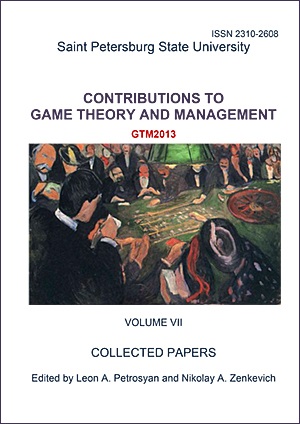Applying Game Theory in Procurement. An Approach for Coping with Dynamic Conditions in Supply Chains
Abstract
Producing companies are facing continually changing conditions accompanied by higher requirements with respect to the flexible configuration of their supply chain. The challenge resulting from this initial situation is to develop systems that have the availability of adjusting their planning procedures and aims depended on the situation and therefore accommodate the increasing demand for flexibility. To address this challenge game theory seems to be a new and promising approach.
The aim and added-value of the research work described here is to develop a decision model for the area of procurement using solutions concepts of game theory. Especially in times of high volatility such a decision model can support material requirements planners better than today's common selective planning logics. In this paper the model to be solved by game theoretic solution concepts is presented. A research study has been conducted which proved the need for combining existing methods of procurement quantity calculation by means of game theoretic solution concepts. Some of the results of this study are presented in this paper. In the last part of the paper a structure for classifying game theoretic models is presented. This structure should support in selecting the appropriate solution concept for real-life decision-situations and is able to support in any practical application-field finding out the most appropriate game theoretic solution concept.
Keywords:
Supply Chain dynamics, procurement quantity calculation, flexibility, game theory
Downloads
References
S., Haag, S., Hauck, E., Herfs, W., Hering, N., Hüsing, M., Isermann, M., Janssen, M., Kausch, B., Kämpf, T., Kratz, S., Kuz, S., Laass, M., Lose, J., Malik, A., Mayer, M., Molitor, T., Müller, S., Odenthal, B., Pavim, A., Petring, D., Potente, T., Pyschny, N., Reßmann, A., Riedel, M., Runge, S., Schenuit, H., Schilberg, D., Schulz, W., Schürmeyer, M., Schüttler, J., Thombansen, U., Veselovac, D., Vette, M., Wagels, C., Willms, K. (2011). Selbstoptimierende Produktionssysteme. In: Integrative Produktionstechnik für Hochlohnländer. Edit.: C. Brecher. Springer, Heidelberg [et al.] , p. 747–1057.
und Logistik; Gesellschaft für Informatik; ASIM-Fachtagung "Simulation in Produktion und Logistik". Heinz-Nixdorf-Inst. Univ. Paderborn, Paderborn, p. 569–578.
Downloads
Published
How to Cite
Issue
Section
License
Articles of "Contributions to Game Theory and Management" are open access distributed under the terms of the License Agreement with Saint Petersburg State University, which permits to the authors unrestricted distribution and self-archiving free of charge.




